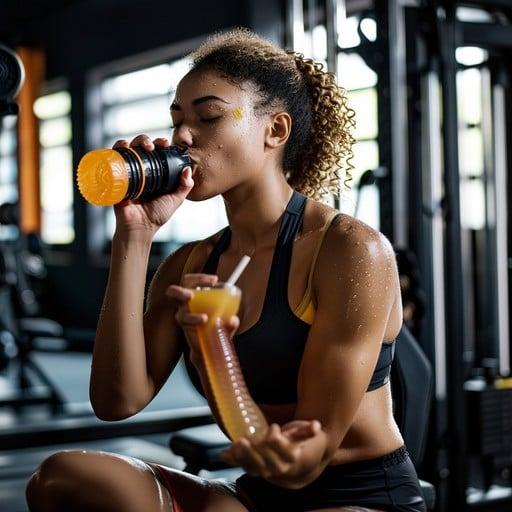In the realm of high-intensity cardio, where heartbeats echo like a drummer’s rhythm and sweat cascades like a waterfall, hydration emerges as the unsung hero of endurance and performance. As athletes push their limits, striving to conquer personal bests and shatter boundaries, the simple act of staying adequately hydrated becomes a crucial component of their success. This article delves into the vital role that hydration plays in high-intensity cardio workouts, exploring the science behind its importance and offering insights into how it can enhance both physical performance and overall well-being. Whether you’re a seasoned athlete or a newcomer to the cardio scene, understanding the significance of hydration can transform your workout experience, ensuring that every drop of effort counts.
Balancing Act: Hydration and Performance in High-Intensity Cardio
In the realm of high-intensity cardio, maintaining optimal hydration levels is akin to a tightrope walk—delicate yet essential for peak performance. Hydration plays a pivotal role in regulating body temperature, lubricating joints, and delivering nutrients to cells. Without it, athletes risk diminished endurance, increased fatigue, and a greater likelihood of heat-related illnesses. A well-hydrated body is better equipped to manage the demands of intense exercise, ensuring that each stride, jump, or sprint is executed with precision and power.
- Improved Endurance: Proper hydration helps sustain energy levels and delay the onset of fatigue.
- Enhanced Focus: Staying hydrated supports cognitive functions, aiding in concentration and decision-making.
- Efficient Recovery: Water aids in muscle recovery post-exercise, reducing soreness and facilitating repair.
To navigate this balancing act effectively, it’s crucial to listen to your body and adopt a proactive approach. This might include sipping water consistently throughout your workout, opting for electrolyte-rich drinks when necessary, and ensuring a balanced intake before, during, and after exercise. By prioritizing hydration, you not only enhance your physical capabilities but also safeguard your overall health, turning every cardio session into a triumph of endurance and strength.

Understanding Fluid Needs: How Much Water is Enough
When engaging in high-intensity cardio, understanding your body’s fluid needs becomes crucial. The amount of water one requires can vary based on several factors, such as body weight, environmental conditions, and the intensity and duration of the workout. Here are some key points to consider:
- Body Weight: A general guideline is to consume about half an ounce to an ounce of water per pound of body weight daily. However, this can increase with more intense activity levels.
- Environment: Hot and humid conditions demand a higher intake to compensate for increased sweat loss.
- Duration and Intensity: Longer and more intense workouts require additional hydration before, during, and after the exercise session.
To maintain optimal performance and prevent dehydration, it’s essential to listen to your body’s signals and adjust your water intake accordingly. Staying adequately hydrated not only supports physical performance but also aids in recovery and reduces the risk of heat-related illnesses. Remember, proper hydration is a cornerstone of effective cardio training.

Timing Your Sips: Optimal Hydration Strategies for Cardio Workouts
Mastering the art of hydration can significantly enhance your cardio workout performance. As you lace up your sneakers and prepare to conquer the treadmill or pavement, remember that timing your water intake is as crucial as the workout itself. Consider sipping water strategically throughout your session to maintain energy levels and prevent dehydration. Here are some optimal hydration strategies to keep in mind:
- Pre-Workout: Aim to drink about 16-20 ounces of water 2-3 hours before you start. This gives your body ample time to absorb the fluid and prepare for the exertion ahead.
- During Workout: For every 20 minutes of exercise, try to consume 7-10 ounces of water. Use a water bottle with measurement markers to help you keep track.
- Post-Workout: Replenish with at least 16-24 ounces of water for every pound lost during your workout. This helps restore fluid balance and aids in recovery.
By following these hydration strategies, you not only ensure optimal performance but also safeguard your health, allowing you to push through high-intensity cardio sessions with greater ease and effectiveness.

Electrolytes and Endurance: The Role of Minerals in Sustained Cardio
When engaging in high-intensity cardio, it’s not just about water intake. The body requires a delicate balance of electrolytes to maintain endurance and performance. These vital minerals—such as sodium, potassium, calcium, and magnesium—act as the body’s natural conductors, facilitating nerve impulses and muscle contractions. Without adequate levels, you might experience cramping, fatigue, or even dizziness, all of which can impede your workout.
To ensure your body has the necessary electrolytes for sustained cardio, consider incorporating the following into your routine:
- Electrolyte-rich drinks: Opt for beverages that offer a balanced mix of minerals, especially during prolonged exercise sessions.
- Natural sources: Foods like bananas, nuts, and leafy greens are excellent for replenishing electrolytes naturally.
- Supplementation: If your diet or workout demands it, consider supplements to boost your electrolyte levels.
By focusing on both hydration and electrolyte balance, you can enhance your endurance and maximize the benefits of your high-intensity cardio workouts.
